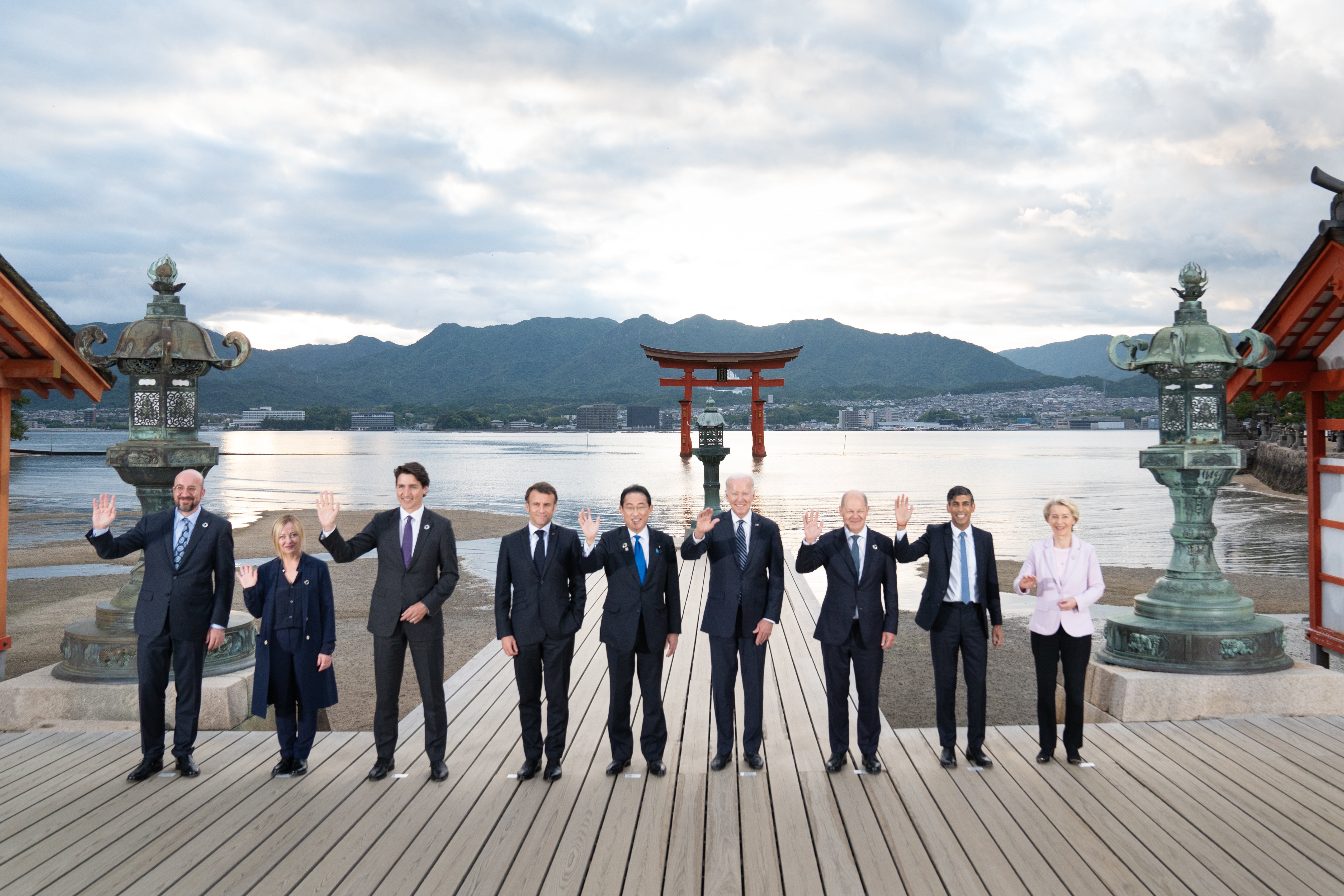As Zelensky flies in to the G7, oily Russia is once again slipping the net
Editorial: The Russian economy has suffered from its isolation, and from the sudden withdrawal of Western trade and investment, but it has certainly not been ‘strangled’

If nothing else, Volodymyr Zelensky’s presence at the G7 summit sends a powerful message, not least to the Kremlin, that he retains the support of the West’s largest economies.
Despite signs of wobbling from Emmanuel Macron during his recent trip to Beijing, President Zelensky should be reassured that he can still rely on the West to resist Russian territorial expansion in Europe.
Among other ringing endorsements of the Ukrainian effort to liberate itself from colonisation, the G7 members declared that they were renewing their commitment “to provide the financial, humanitarian, military and diplomatic support Ukraine requires for as long as it takes”, adding: “We are imposing further sanctions and measures to increase the costs to Russia and those who are supporting its war effort.”
They also renewed their essential demand for Russia’s unconditional withdrawal “from the entire internationally recognised territory of Ukraine”.
What’s more, they have imposed further sanctions on Russia, and on “those who support its war effort”, in an effort to “starve the Russian war machine”. The UK, in a curious footnote, has also promised to curb imports of Russian diamonds, as well as to target yet more entities and individuals connected to Vladimir Putin.
These new measures are very welcome, but President Zelensky might be forgiven for wondering why these incremental steps are being taken only now.
It was perfectly apparent, when President Putin’s ill-fated “special military operation” was launched last year, that the best and most immediate measure the West could take in response to the emergency was to wage economic war on Russia far beyond the usual weak habit of imposing international sanctions.
The Russian economy has suffered from its isolation, and from the sudden withdrawal of Western trade and investment, but it has certainly not been “strangled”. Indeed, there are disturbing signs that the country has been able to evade some of the West’s sanctions.
Trade with friendly powers such as China and India has shot up since the war began; the spikes in the price of energy have subsided (suggesting supplies are making their way into world markets); and Russia has been able to draw upon the considerable sanctions-busting expertise of Iran and North Korea, both defiantly unstrangled after decades of restrictions and embargoes.
In addition, Saudi Arabia has proved resistant to calls for it to increase oil production in order to prevent a world recession, and has declined to sanction Moscow. South Africa, another nascent ally, has foolishly engaged in joint naval manoeuvres with the Russians, and perhaps in even more sinister operations as well. Meanwhile, China continues to pursue its self-appointed role of global peacemaker.
Fortunately for Mr Zelensky and the G7, Narendra Modi is also a guest in Tokyo, so the assembled world leaders can try to prevail upon him, at least, to drop his self-delusion about President Putin and do the right thing. Still, though, the G7 is faced with the difficult challenge of using secondary sanctions against India, China, Saudi Arabia, South Africa, and other important players, in an attempt to make the original sanctions stick.
The risk is of another round of protectionist retaliation by those sanctioned, and a further push towards a global economic slowdown, with minimal impact on the Russian war machine.
As for the military effort, Mr Zelensky will no doubt remind the assembled presidents and prime ministers (and the German chancellor) that they are still to deliver to Ukraine the final, decisive factor that could guarantee a rapid end to this war – air superiority. It is foolish, as well as a betrayal, for the West to commit vast (and expensive) quantities of armour and missile systems without the aircraft that will help Ukraine’s forces to operate them effectively on the battlefield, and protect them from early destruction.
As the British defence secretary, Ben Wallace, among others, has frequently stressed, it is not simply about flying some planes east and letting the Ukrainians get on with it; we must be more akin to a Formula One team, providing expertise and logistical infrastructure as well as the vehicles themselves. Either way, though, the West is dithering too much on air power.
All that said, Mr Zelensky is among friends in Tokyo, and will be able to make his case personally and eloquently to these leaders of the democratic world, and indeed to the peoples they represent.
He has already done so in Jeddah, to the Arab League – a tough audience given the links many (notably Syria’s Bashar al-Assad) have with Russia. These countries, though, can also exert influence on Russia, which is needed to preserve the supplies of grain and edible oils from blockaded Ukraine to Egypt and other markets. To borrow a redolent phrase from the past, if the West gives him the tools, then Mr Zelensky will finish the job.






Join our commenting forum
Join thought-provoking conversations, follow other Independent readers and see their replies
Comments